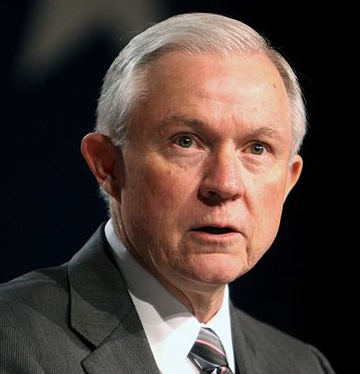Did Attorney General Sessions violate his recusal pledge by participating in Comey firing?

Attorney General Jeff Session/Gage Skidmore
Democrats and some legal ethics experts are accusing Attorney General Jeff Sessions of violating his pledge to recuse himself from matters arising from the presidential campaign by participating in the firing of FBI Director James Comey.
The memo making the case for Comey’s firing was written by Deputy Attorney General Rod Rosenstein, but it was titled “Memorandum for the Attorney General.” The memo criticized Comey for his handling into the probe of Hillary Clinton’s use of a private server for her emails when she was secretary of state.
According to the Washington Post, Sessions consulted with President Donald Trump and coordinated Comey’s firing. Comey had been leading the investigation into Russian interference in the election and whether there was any coordination with the Trump campaign.
Sessions had recused himself from investigations arising from the presidential campaign after revelations that he had twice met with Russian ambassador Sergey Kislyak last year. Sessions did not mention the contacts during his confirmation hearing.
Justice Department spokesman Ian Prior told NPR that Sessions’ recusal did not bar him from participating in the decision to fire Comey.
“The recommendation to remove Director Comey was a personnel decision based on concerns about the effectiveness of his leadership,” Prior said. “The recommendation had nothing to do with the substance of any investigation.”
Fordham University law professor Bruce Green echoed that view in an interview with NPR.
“The question of Mr. Comey’s ability to lead the FBI going forward and to maintain public confidence is not the same as the question of how the existing and future investigations of the presidential campaigns should be conducted,” he said. “The [attorney general’s] recusal did not explicitly cover this and, in any event, it was up to the AG to interpret the scope of his own recusal.”
Others disagree. In an interview with NBC News, New York University law professor Stephen Gillers argues that the scope of the recusal was broad, and it encompasses the reasons Rosenstein stated for Comey’s firing—his comments about the Clinton investigation during the campaign.
Gillers argues that Sessions’ written recusal statement was a “legally operative document.”
The Post alternatively suggests Sessions may have violated his recusal pledge because Comey was leading the Russia investigation and Sessions recommended he be fired. And that would be relevant to any ethics investigation, particularly if Sessions had a conflict of interest in regards to the firing decision, according to Norman Eisen, a former ethics lawyer for the Obama administration.
“The fact that he broke his recusal commitment, if he did, would be relevant context, and violating an agreement can sometimes in itself be an ethics violation,” Eisen told the Post.
Sessions’ involvement in the firing could also be seen as an effort to assist President Trump in obstructing justice, if Trump’s firing of Comey were done with the purpose of shutting down the Russia investigation, Harvard law professor Laurence Tribe told the Post.
“And part of the evidence supporting the charge of AG Sessions’ conscious involvement in that obstruction is the way in which he violated his public recusal commitment, something he cannot possibly have done in a fit of absent-mindedness,” Tribe said.



